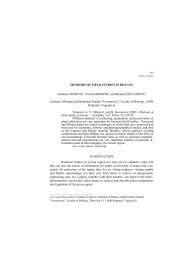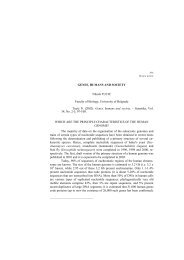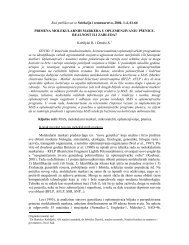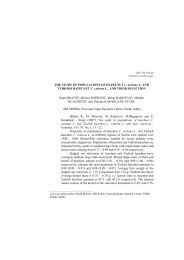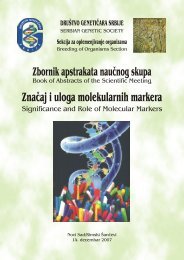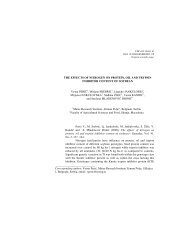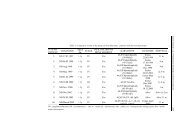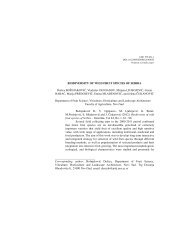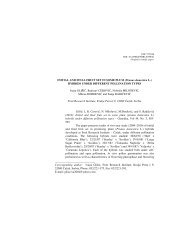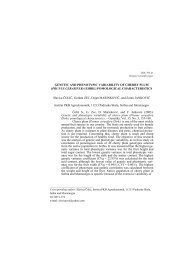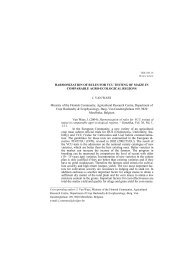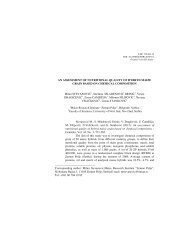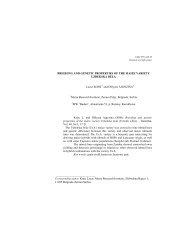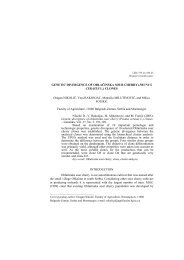Zbornik - Društvo genetičara Srbije
Zbornik - Društvo genetičara Srbije
Zbornik - Društvo genetičara Srbije
You also want an ePaper? Increase the reach of your titles
YUMPU automatically turns print PDFs into web optimized ePapers that Google loves.
IV-Uvo-4 ZBORNIK ABSTRAKATA III KONGRESA GENETIÈARA SRBIJE 87<br />
Subotica, 30. novembar - 4. decembar 2004.<br />
ORGANSKO OPLEMENJIVANJE BILJA<br />
J. Berenji<br />
Institut za ratarstvo i povrtarstvo, Novi Sad<br />
Propisi koji regulišu oblast organske proizvodnje navode posebne zahteve prema semenu<br />
i sadnom materijalu. Na ovaj naèin certifikacija organskih proizvoda je striktno<br />
uslovljena pridravanjem zahteva prema semenu i sadnom materijalu. Upotreba<br />
genetièki modifikovanih (transgenih) sorti kao i primena savremene biotehnolgije u<br />
oplemenjivanju bilja je zabranjena, osim upotrebe genetièkih markera u selekciji. U<br />
praksi organske proizvodnje se razlikuju tri faze po pitanju sorti i soznog semena. U<br />
prvoj fazi (koja je zvanièno trajala do 1. januara 2004) bila je dozvoljena upotreba<br />
sortnog semena bilo koje sorte stvorene konvencionalnim putem ukoliko je takvo seme<br />
umnoavano bar jedne godine (kod višegodišnjih vrsta dve godine) u organskim<br />
uslovima. U drugoj fazi, koja je sada aktuelna, javlja se zahtev da se uz umnoavanje i<br />
samo odravanje sorte vrši u organskim uslovima najmanje tri godine. Treæa faza æe<br />
zahtevati da se koriste samo tzv. organske sorte koje su nastale u procesu organskog<br />
oplemenjivanja bilja. Neki od najvanijihh genetièkih principa organske proizvodnje su:<br />
(1) da farmeri sami mogu umnoavati sortno seme za svoje potrebe (s tim u vezi ostalo je<br />
otvoreno pitanje statusa F1 hibrida koje je nemoguæe dalje umnoavati bez gubitka<br />
genetièkog identiteta hibrida); (2) postojanje genetièke varijabilnosti unutar sorte (u cilju<br />
bolje adaptabilnosti i da se uspori širenje bolesti i štetoèina); (3) otpornost (po<br />
moguænosti horizontalna) na bolesti i štetoèine; (4) razvijen i efikasan korenov sistem i<br />
sposobnost potiskivanja korova.<br />
ORGANIC PLANT BREEDING<br />
The legislation that regulates organic agriculture enforces special requirements regarding<br />
seed and planting material. Certification of organic produce is strict with respect to the<br />
adherence to these requirements. Use of genetically modified (transgenic) varieties and<br />
application of modern biotechnology, with the exception of the use of genetic markers<br />
for selection, are prohibited in plant breeding. Organic production distinguishes three<br />
phases that concern varieties and certified seed. In the first phase (which officially lasted<br />
till 1 January 2004), it was permitted to use certified seed of any conventionally developed<br />
variety if that seed had been multiplied for at least one year (two years in the case of<br />
perennial species) in organic production. In the second phase, which is presently in due<br />
course, variety multiplication and maintenance under organic conditions must last for at<br />
least three years. The third phase will require an exclusive use of the so-called organic<br />
varieties, those that shall have been developed in the process of organic plant breeding.<br />
These are the major genetic principles of organic production: (1) farmers are permitted to<br />
multiply their own seed (the question of F1 hybrids which cannot be multiplied without<br />
the loss of genetic identity remains open); (2) genetic variability exists within the variety<br />
(aimed at improved adaptability and slower distribution of diseases and pests); (3) resistance<br />
(horizontal if possible) to diseases and pests; (4) well-developed and efficient root<br />
system and capacity of weed repellence.



